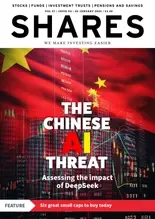
European stocks were in the green at Friday midday after a slew of fiscal stimulus measures from China, and as investors await key US inflation data which is crucial in the Federal Reserve’s interest rate decisions.
The core personal consumption index remains traders’ main focus going into Friday afternoon, and is expected to remain unchanged at 0.2% on a monthly basis with a small annual uptick from 2.6% to 2.7%.
‘A set of data in line with expectations will certainly keep the soft-landing vibes in play and secure a 43rd record high for the S&P500 before the weekly closing bell, Swissquote’s Ipek Ozkardeskaya said. ’But a stronger-than-expected PCE read, God forbid, could bring the idea that the Fed and the doveish Fed expectations may have gone ahead of themselves and call for some correction.
‘Yesterday’s robust GDP read brought the probability of 50bp cut at the November meeting slightly below 50%, but the chances are still very close to a coin toss.’
In Asian markets, China has cut the amount banks must hold in reserve in the latest ingredient of its ‘explosive cocktail of monetary and fiscal measures’, releasing an estimated $142.6 billion in liquidity into the financial market.
‘Having been one of the most unloved parts of the investment market for several years, investors have raced to buy Chinese shares in a blockbuster week for Asian markets,’ AJ Bell’s Russ Mould said. ‘A veritable feast of economic stimulus measures has led investors to take a more optimistic view of the earnings potential for Chinese companies and foreign ones selling into the country. Lower borrowing costs, smaller deposits for buying homes and more capacity for banks to lend money – these lay the foundations for greater economic activity...But whether the desired results end up meeting investors‘ expectations is another thing.
‘China is notorious for throwing stimulus measures left, right and centre, and the success rate is patchy to say the least.’
The FTSE 100 index was up 38.27 points, 0.5%, at 8,323.18. The FTSE 250 was up 99.90 points, 0.5%, at 21,110.34, and the AIM All-Share was up 39.23 points, 0.5%, at 8,324.14.
On the FTSE 100, Haleon rose 0.4%.
The Weybridge, Surrey-based consumer healthcare firm said it will acquire an additional 33% equity interest in Tianjin TSKF Pharmaceutical Co Ltd, its JV in China, for a total of ¥4.47 billion or about £500 million.
The acquisition, subject to regulatory clearances, will see Haleon increase its stake to 88% from 55%.
Haleon highlights that TSKF accounted for about 40% of its China revenue in financial year 2023.
Speaking of China, miners continued to mainly respond well to the People’s Bank’s stimulus measures. Glencore rose 1.0% having gained 10% this week. Rio Tinto rose 0.8% having jumped 12% since Monday, while Anglo American has risen 11%.
Rightmove however led the laggers, declining 1.3% after REA Group announced yet another takeover proposal.
REA on Friday issued its fourth acquisition proposal to the board of Rightmove PLC, urging the company to engage in dialogue and extend the offer deadline.
The Melbourne, Australia-based digital advertising company, majority owned by Rupert Murdoch’s News Corp, has issued its fourth proposal in an attempt to acquire the Milton-Keynes, England-based online real estate company.
It follows offers previously rejected earlier in September that initially valued Rightmove at £5.6 billion before REA upped its offer to £6.1 billion.
The terms of the fourth proposal outline that Rightmove shareholders would receive for each share owned, 346 pence in cash and 0.0417 of a new REA share. This would be supplemented by a 6p per share special dividend meaning the fresh offer values individual Rightmove shares at 781p each, implying a total company value of £6.2 billion.
‘REA is ready to engage immediately and firmly believes that engagement is now essential in order to progress the proposal and an extension to the 30 September 2024 deadline should be granted by the [Rightmove] board,’ REA commented.
On the FTSE 250, Burberry rose 5.6%, among the luxury retailers continue to respond well to China’s improved outlook.
‘Chinese consumers have historically been a major buyer of its clothes, and so greater economic activity could in theory see these individuals willing to spend more cash on its chequered wares,’ Mould explained. ‘Burberry needs all the good news it can get, given how its share price had until this week been on a downtrend since April 2023 amid various setbacks to trading and strategy.’
The Cboe UK 100 was up 0.5% at 833.29, the Cboe UK 250 was up 0.6% at 18,636.89, and the Cboe Small Companies was up 0.5% at 14,745.60.
In European equities on Friday, the CAC 40 in Paris was up 0.3%, while the DAX 40 in Frankfurt was up 0.8%.
Germany’s seasonally adjusted unemployment rate remained unchanged in September, the country’s Federal Employment Agency reported.
The rate stood at 6.0% in September, while its unadjusted rate ticked down to 6.0% in September from 6.1% in August. September’s jobless rate was in line with the FXStreet-cited consensus.
Spain’s economy grew faster than anticipated in the second quarter of the year, while inflation slowed in September, data published by the National Statistics Institute showed. The consumer price index is estimated to have risen 1.5% in September from a year before, slowed from an increase of 2.3% in August. It was a bigger slowdown than the FXStreet-cited consensus of 1.9%.
Meanwhile France’s consumer price index is estimated to have risen by 1.2% on-year in September, easing from a 1.8% increase in August, according to provisional estimates.
‘Inflation prints for Spain and France have come in very soft this morning, likely resulting in a first sub-2% eurozone inflation print for September,’ ING’s Bert Colijn explained.
‘While this is related to base effects and inflation is expected to tick up again towards the end of the year, the question is by how much this can happen. Petrol prices have dropped significantly in recent weeks on the lower oil price, which limits the prospects of a headline inflation rebound. For the European Central Bank, a lot of focus will be on whether core inflation will come down though, with services inflation as its main concern.’
The eurozone economic sentiment indicator dropped from 96.5 to 96.2 in September, as ‘selling price expectations for services continued to moderate slightly’ Colijn said.
‘Weaker growth prospects and easing inflation concerns show a clear turning in eurozone sentiment at the moment, which adds doveish pressure on the ECB.’
The pound was quoted at $1.3388 at midday on Friday in London, lower compared to $1.3412 at the equities close on Thursday. The euro stood at $1.1163, slightly down against $1.1179. Against the yen, the dollar was trading at JP¥143.22, down compared to JP¥144.69.
Bannockburn attributed the yen’s rise to the election of Shigeru Ishiba as the leader of Japan’s ruling party and by extension as its prime minister.
‘It turns out that the economy may have been less important than foreign affairs and the threat posed by China,’ analysts said. ‘Shigeru Ishiba is [a] strong nationalist, who reports indicate own shares in Nippon Steel, whose bid for US steel has faced domestic opposition in the US on seemingly nationalist, rather than economic grounds.’
Stocks in New York were called lower. The Dow Jones Industrial Average was called marginally down, the S&P 500 index down 0.1%, and the Nasdaq Composite down 0.3%.
Brent oil was quoted at $71.28 a barrel at midday in London on Friday, down from $71.58 late Thursday.
‘Oil prices continued to be volatile after yesterday’s 2.5% decline amid fears that supplies could increase from the Middle East,’ AJ Bell’s Mould said. ‘There have been reports that Saudi Arabia and Libya could soon boost output which has triggered a sell-off in the price of oil...we’ve seen a 19% decline in the energy price in just two months.
‘Clearly that’s good for businesses as it cuts their transport and energy costs. It’s also good for the general public as it makes filling up the car a lot cheaper – in fact, it was only two days ago that the RAC said petrol prices had fallen to their lowest level for three years. They may now get even cheaper.’
Gold was quoted lower at $2,663.83 an ounce against $2,669.65 on Thursday.
The yellow metal is ‘headed for a third weekly gain after setting successive record highs on optimism the [US] Fed will maintain an aggressive pace of interest-rate cuts this year’, Nedbank explained.
Still to come on Friday’s economic calendar, there will be data from the US Fed’s preferred inflation gauge, the personal consumption expenditure index, alongside trade balance and wholesale inventories data at 1330 BST just after comments from Fed Governor Michelle Bowman.
Copyright 2024 Alliance News Ltd. All Rights Reserved.




